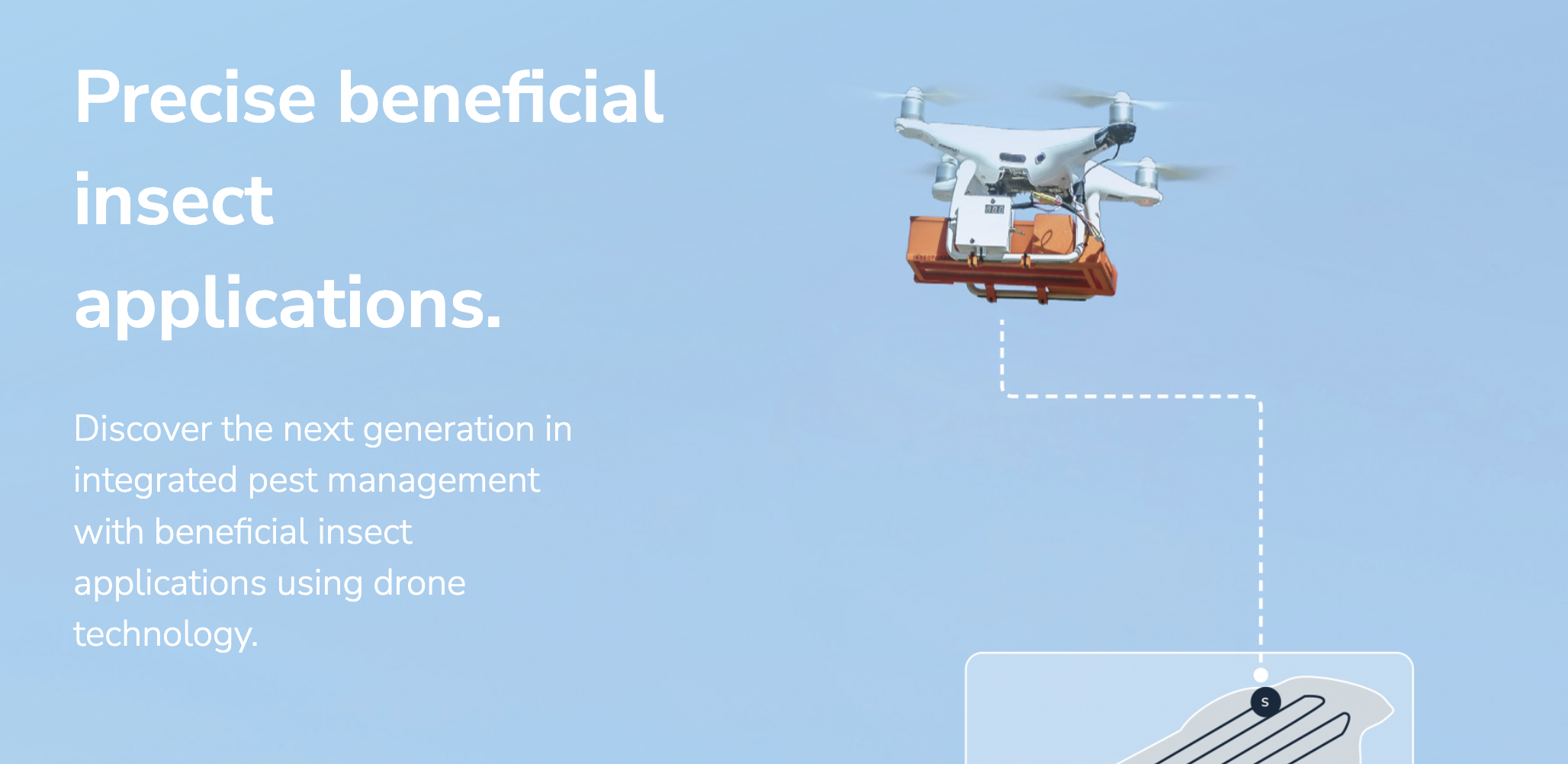SkyBugs: Precise beneficial insect applications
The battle between growers and invasive pests has been a never ending concern from the earliest start of commercial crop production. With increasing market demands, growers now face a formidable challenge to produce crops with little to zero chemical residue levels.
As the intricate dance of nature intertwined with commercial agricultural ecosystems takes place, beneficial insects increasingly come to the fore in playing a pivotal role in maintaining a very delicate balance in orchards where a perceived balance has been forced into asymmetry that becomes unbalanced over time with biodiversity loss, chemical resistance, and the like.
The shift from stability to chaos is arguably mostly due to widespread (and prolonged) hard chemical use for controlling pests, often in a “calendar spraying” fashion.
Beneficial insects like predatory beetles, wasps, mites, and lacewings act as guardian insects and naturally important control mechanisms, patrolling crops keeping pest populations in check without the need for excessive chemical interventions.
The use of biological solutions, especially beneficial insect use, undoubtedly plays a major role in a well-thought-out integrated approach to managing pests effectively and efficiently, and in harmony with nature as far as possible.
Ladybugs, for instance, voraciously consume aphids that can wreak havoc on fruit trees and grapevines. Similarly, parasitic wasps, like the tiny Trichogramma species, target destructive moth eggs, preventing potential infestations. By harnessing these beneficial insects that hinder the spread of unwanted pests, farmers can effectively reduce pest pressure, resulting in fewer crop quality concerns, a reduction in pest related yield losses, while minimising the environmental impact of excessive pesticide use.
Maintaining a balance between beneficial insects and pests contributes to healthier orchards and vineyards, resulting in better-quality produce. Moreover, incorporating beneficial insects into sound IPM strategies can potentially reduce costs associated with purchasing and applying chemical pesticides.
There is no doubt that utilizing natural allies such as beneficials fosters a more sustainable agricultural ecosystem by preserving biodiversity and minimizing negative impacts on the environment. By employing natural predators, farmers decrease reliance on chemicals and ensure safer and more environmentally friendly farming practices.
The SkyBugs BioControl Solution
SkyBugs offers the next generation in integrated pest management, complementing existing crop protection strategies to help farmers mitigate yield loss season after season, Achieving uniform and accurate beneficial insect dispersal for effective biological control at scale.
Uniform dispersal of several beneficial insects by Unmanned Aerial Vehicles (UAVs) AKA drones, has the advantage of accurately targeting your pest hot-spots in problem blocks, for a marked impact at a per-tree level. A 50 meter predatory search radius and a 20m buffer: additional insects compared to traditional release methods.
The nature of the release route by drone together with this buffer figure ensures an even spread of released insects over the designated drop zone leading to a lower population variances and an effective search radius, especially where buffer release populations create search radii that overlap for faster control of the targeted pest with less fuss and time spent compared to hand-released practices.
The SkyBugs method ensures accurate release of beneficial insects on designated blocks with quick turnaround times, while ensuring fewer inherent labor risks like human-error or specific expertise; reducing the need for additional workforce hours in-field. This approach helps Integrated Pest Management (IPM) specialists in supporting their strategies and their farmers by alleviating workforce bottlenecks and by making better use of human capital on-farm.
Efficient dispersion of quality beneficials in their prime developmental condition aided by the use of precision designed UAV-integrated dispersal equipment, is paired with detailed record keeping for every release operation. SkyBugs provides accurate quantity statistics of which beneficials were dispersed where, and with a detailed post-flight report after every drone flight conducted.
Above: Agmo Drone Services as featured in the The Macadamia magazine’s #IMS2023 feature on precision farming, whilepresenting SkyBugs solutions at the Aerobotics symposium event stand.
Beneficial insects currently available include Perminutus, Anagyrus, and Lacewing for the management of targeted pests like Mealybug. Lacewings in particular help to control other soft bodied pests too such as aphid infestations.
Additionally, advanced Trissolcus trials are in progress as part of the greater SkyBugs arsenal for the control of Stink Bug, with positive initial dispersion and pest control efficacy results. More and more beneficial insect options are set to become available as the release technology and dispersion methods advance with the needs of farming operations and nature-first IPM strategies.
Focus crops for SkyBugs releases currently include: Citrus, Avocados, Macadamias, Mangoes, Wine Grapes and Table Grapes, Stone fruit, and Blueberries.
Agmo Drone Services is a certified and preferred service provider for SkyBugs flight missions in the Lowveld and Highveld regions.
Get in touch with us directly for a tailored quote from the SkyBugs team, or to learn more.



